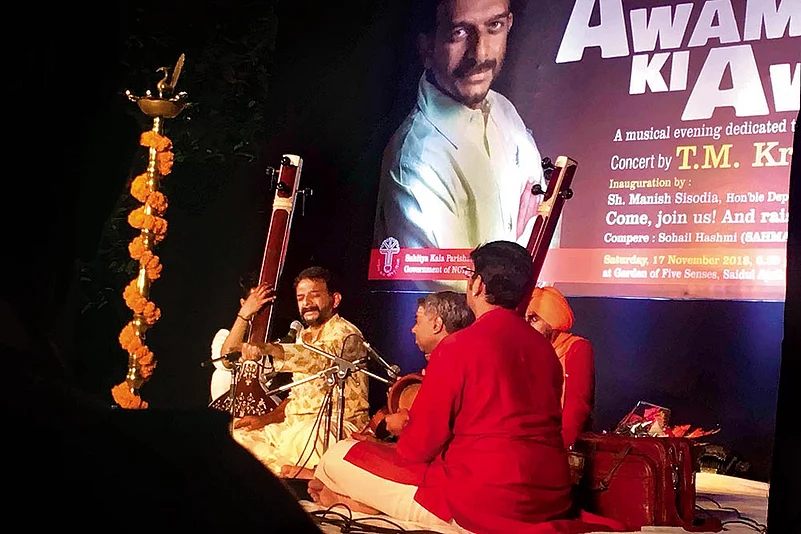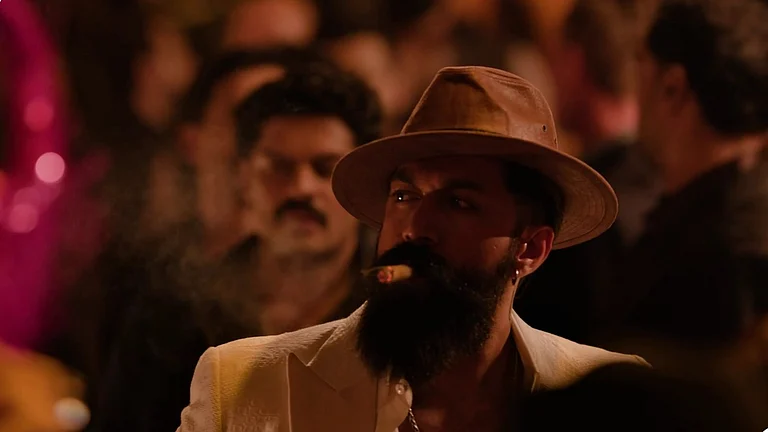A brief sequence of events first, about my November 17 concert in Delhi that was famously “postponed” at the last minute. The bare-bones story suffices to reveal the real nature of what had happened, almost on the eve of that event. The schedule of Spic-Macay’s two-day ‘Dance and Music in the Park’ programme, of which my concert was to be a part, had been confirmed a few months ago. The whole show was to be co-presented by the Airports Authority of India (AAI). In early November, the AAI proudly tweeted that they were presenting my concert in Delhi as part of the two-day programme. I had retweeted their tweet. So far, so good.
It was on November 12 that the trolling began. The AAI was targeted viciously on social media for having associated itself with my concert. And I was of course anointed with the now-familiar abuses—“anti-national”, “urban Naxal”, “anti-Hindu”—and questions were asked about how a person who is anti-BJP and critical of Prime Minister Narendra Modi could be featured by the AAI. The trolls had tagged several central ministers and the PMO in their tweets. I have been told that Spic-Macay was informed about the trolling on November 13 but were reassured that the concert would go on as planned. Later in the day, they were asked by AAI to make extra security arrangements. Despite that off-stage drama, everything seemed fine until that evening.
All of a sudden, late on November 13, Spic-Macay volunteers were told at a meeting that the entire festival had to be postponed due to “exigencies of work”. This, of course, makes very little sense because all the actual heavy lifting for concerts is done by Spic-Macay and arrangements were already in place. Until today, the only reason given by AAI is the sudden appearance of urgent work and, consequently, their unavailability on the given day. How do you parse that? I leave it to you to decide. For me, the answer is just too obvious.
To be sure, art has always borne the marks left on it by the realm of the political—whether formal politics or just the logic of power. Art and artists have always been controlled by kings, zamindars, rich business people, bureaucrats, politicians and corporations. But what makes these times even worse is the brazenness with which the political class is in cahoots with hate-mongers. The very fact that trolls can influence people who have political power should worry every one of us. There exists an unmistakable collaborative network between ‘troll armies’ and politicians—they seem to support and work with, and for, each other. Which means trolling is an organised operation that has its tentacles spread wide and deep. Therefore, mechanisms of control are now operated from within and beyond governments, using ‘fringe groups’, ‘troll armies’ and such like. This has allowed political powers to either enforce artistic control from above, or encourage self-censorship by spreading fear among the creative community—all this even while democracy seems to be functioning. Isn’t this a tipping point?
To those who hold the opinion that the government should not be sponsoring or offering patronage to art, I have only this to say: I disagree entirely. It is essential that the government plays a very important role in art, and I mean all forms of art—especially, and I would emphasise this, the art and culture of those who have been marginalised. I say this specifically because we classical types have enjoyed too many benefits in the form of money, tours and awards from governments right from Independence. Art support in this country has been discriminative and this has to change. But governments must participate not just as sponsors but as enablers because our arts and cultures are the soul of the citizens and change begins here, not anywhere else. Supporting art is not a favour the government is doing us: art is part of our everyday lives, it is who we are and also who we can be and hence the government must engage with it in all seriousness.
Beyond this, there seems to be disquiet in some quarters about the very idea of an artist having political views. These critics imagine them as separate, hermetically sealed-off realms. I do not agree with this characterisation. Art for art’s sake is a lie perpetuated by the cultural elite. Art is and will always be political. An art object is an aesthetic, philosophical, political and social being. And whether or not the artist articulates his or her politics, the art object always embodies it. Therefore, the most divine experience too is a political comment. The very fact that people demand that art must exist in an autonomous realm reveals the politics of art. For which art forms do we make this demand? Who makes these demands? The moment we investigate the subtexts in these questions, we realise the political. I would invert this discourse and say we have deliberately suppressed, whitewashed or brushed aside the political within certain art forms—especially the classical—in order to ‘other’ the art of those who live beyond this privy circle.
My own involvement in social, political and environmental discourses has been organic and part of my wanderings. I am a singer who believes that it is the profundity of music that has nudged me towards becoming an active, self-critical citizen. Every musical movement, in its most abstract form, reveals the beauty that exists in life when we cease judgement, discrimination, categorisation, control and subjugation. Therefore, this is a beauty that unveils our ugliness. Music poses difficult questions and I try to pay attention to it. Liberating myself from the December music festival in Chennai was an extension of this; it was, for me, an essential step in trying to explore art, space, people, sharing, access and questioning.
I am aware that these days some people proffer another line of critique—that my pursuits are estranging rasikas, that I am departing from the ‘purity’ of Carnatic music, diluting its ‘essence’, and tinkering with the ‘canon’. Stay on these words: purity, essence, canon. In order to understand these words, we must be willing to dive deep into the music, shedding our self-affirming, habituated pillars of aural support. Purity is a fraudulent notion paraded by those who seek control. I have always found it fascinating that even so-called liberals, who are otherwise in complete agreement with my socio-political discourse, find it difficult to put themselves through the same rigorous questioning when it comes to aesthetic nuances. I do not expect them to change their preferences, but this owes to not just conviction; it’s an inability to recognise the fallacy in their notion of aesthetic purity or superiority. It’s indeed interesting. Without realising it themselves, their privileges limit their experiential canvas.
I seek the essence of the music and that exists deep inside, beyond the glare of the exterior, the exterior that we are all holding on to. It is the essence that changed me, transformed me. Therefore, I am trying my best to keep true to the essence, but this essence does not control me or force me to conform, it is a liberator. Canons, on the other hand, are like ordinances: they do not allow for democratic thought, questioning, change or challenge. Therefore, I have thrown those canons into the deep sea. I do believe there is continuity in any art form, a thread that connects the future with the present and the present with a past. But this is not a literal, binding document. It exists within the sound, the movement, the interior structure, intra-relationships between the aspects that constitute its aesthetic intentionality. In Carnatic music it is raga, tala and text. They guide me in my music and I listen to them intently. If people are moving away from my music, so be it. As a singer, I am answerable only to the music, absolutely no one else.
(The author is a Carnatic vocalist, author, public speaker and writer on human choices, dilemmas and concerns)

























